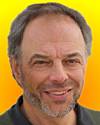 (source)
(source)
|
Carl Safina
(23 May 1955 - )
American ecologist and writer whose books and magazine articles reflect his interest in ocean ecology. He is the founding president of the Blue Ocean Institute.
|
Science Quotes by Carl Safina (10 quotes)
As a teenage fisherman, I watched and followed terns to find fish. Later I studied terns for my Ph.D. During those studies I came to see and love other seabirds. Albatrosses are the biggest, so they get your attention.
— Carl Safina
In 'Field Notes', National Geographic (Dec 2007).
I almost threw up. I got physically ill when I learned that ospreys and peregrine falcons weren't raising chicks because of what people were spraying on bugs at their farms and lawns. This was the first time I learned that humans could impact the environment with chemicals. [That a corporation would create a product that didn’t operate as advertised] was shocking in a way we weren’t inured to.
— Carl Safina
About reading Rachel Carson's Silent Spring, age 14, in the back seat of his parents’ sedan. As quoted by Eliza Griswold, in 'The Wild Life of “Silent Spring”', New York Times (23 Sep 2012), Magazine 39.
If you ask the fish whether they’d rather have an oil spill or a season of fishing, I wouldn’t be surprised if they’d vote for another blowout.
— Carl Safina
As quoted by Mark Bittman in 'What's Worse Than an Oil Spill?', New York Times (20 Apr 2011), A23.
If you look right, you can see the whole world from wherever you happen to be.
— Carl Safina
As quoted by Karin Lipson in 'The World's Wonders, In an Ecologist's Eyes', New York Times (27 Feb 2011), LI 11.
Many people believe the whole catastrophe is the oil we spill, but that gets diluted and eventually disarmed over time. In fact, the oil we don't spill, the oil we collect, refine and use, produces CO2 and other gases that don't get diluted.
— Carl Safina
As quoted by Mark Bittman in 'What's Worse Than an Oil Spill?', New York Times (20 Apr 2011), A23.
People were getting ridiculous amounts [of bluefin tuna]. Somebody got on the radio and said, “Guys, maybe we should leave some for tomorrow.” Another guy came on and said, “Hey, they didn't leave any buffalo for me.” [Heard from fishermen crowding off Fire Island in 1998, which he cites as his source for the phrase “the last buffalo hunt” inspiring his writings on overfishing.]
— Carl Safina
As quoted by William J. Broad in 'High-Seas Hunter Pleads for Preservation of Fish', New York Times (22 Sep 1998), F1.
Rachel Carson was the best thing America is capable of producing: a modest person, concerned, courageous, and profoundly right—all at the same time. Troubled by knowledge of an emerging threat to the web of life, she took pains to become informed, summoned her courage, breached her confines, and conveyed a diligently constructed message with eloquence enough to catalyze a new social movement. Her life addressed the promise and premise of being truly human.
— Carl Safina
In his Foreward to Rachel Carson, The Sea Around Us (1950, 2003), xvi.
Rachel Carson. Her very name evokes the beatific luminosity of the canonized. Yet Carson was not a saint, but better, a prophet—that rare soul who diverts our attention into the path of the oncoming truth.
— Carl Safina
In his Foreward to Rachel Carson, The Sea Around Us (1950, 2003), xvi.
The ocean is not just blank blue space but rather the habitat for amazing wildlife, and we have to take care how we use it. If we want to keep having the goods and services it provides, we have to treat it more carefully in terms of fishing and dumping.
— Carl Safina
As quoted by Ain Stewart in '2 Long Islanders Get MacArthurs', New York Times (18 Jun 2000), 9.
There’s little use in commercial and recreational fishers pointing fingers at each other. Commercial fishing is not all bad and recreational fishing is not all good. A fish doesn’t care if you are a commercial or a recreational fishermen. It only cares if it is surrounded by water—or on ice.
— Carl Safina
As quoted in Charles Clover, The End of the Line: How Overfishing is Changing the World and what We Eat (2004, 2008), 275.
 In science it often happens that scientists say, 'You know that's a really good argument; my position is mistaken,' and then they would actually change their minds and you never hear that old view from them again. They really do it. It doesn't happen as often as it should, because scientists are human and change is sometimes painful. But it happens every day. I cannot recall the last time something like that happened in politics or religion.
(1987) --
In science it often happens that scientists say, 'You know that's a really good argument; my position is mistaken,' and then they would actually change their minds and you never hear that old view from them again. They really do it. It doesn't happen as often as it should, because scientists are human and change is sometimes painful. But it happens every day. I cannot recall the last time something like that happened in politics or religion.
(1987) -- 


